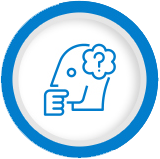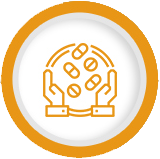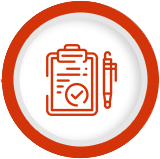Addiction Treatment with Dual Diagnosis
What Is Addiction?
Addiction is a learned way of coping with life. When you try stop using drugs or pursuing addictive behaviours for a few days, you are simply stopping the symptom for a period of time. For deeply embedded addictions, or if you have co-occurring mental disorders, you may require long-term supervised care and extensive therapeutic interventions to put in place your personal framework and guiding principles to live your life in recovery. When you have a co-occurring mental disorder, such as depression, bipolar disorder, an anxiety disorder or Post Traumatic Stress Disorder, your addiction treatment will need to tackle the challenges specific to that disorder alongside helping you to come to terms with and live with your addiction.
Addiction treatment can help you achieve the following:
- Completely stop the use of drugs or participation in addictive behaviours.
- Have strategies to maintain an addiction-free life.
- Become a productive member of the family, work
and society.


Drug Addiction
Drug addiction, also referred to as substance use disorder, is a learned way of coping which affects an individual’s thinking and behaviour, and can result in loss of control. Legal substances like painkillers, alcohol and nicotine are also highly addictive. When you are addicted, you will find it very challenging to stop using the drugs even when the harm they are causing is apparent.
There are many routes you may have taken to drug addiction. You may have begun by experimenting with recreational drugs in social settings, and the drug use then became more regular and less controlled. You may have developed an opioid addiction using prescribed medication. The addictive potential of drugs means you can get dependent or addicted very quickly.
- none Easy
- none Confidential
- none Lifetime Support
Alcohol Addiction
Alcohol addiction is a complex addiction with psychological, behavioural, environmental and genetic factors. The acceptance of alcohol as a “way to relax and unwind” in society, and the easy access everyone has to alcoholic drinks, makes alcoholism a deep-rooted societal problem.
Alcohol addiction, commonly called alcoholism, is a disease which may affect anyone, regardless of sex, race, or socioeconomic status. Scientists have tried to look for a single causal factor for alcohol addiction, but none has been found. There is a lot of evidence that people who suffer from depressive disorders and anxiety disorders, as well as other mental disorders, are at higher risk of developing an alcohol problem. The increasing incidence of anxiety disorders, depression and other mental disorders in society is causing more and more people to turn to alcohol as an escape from life.
It is important that you understand that alcoholism is a disease. It causes changes to your brain neurochemistry in a way that makes it difficult for you to control urges to drink, and to think rationally.
Alcohol addiction can present in different forms. How badly your drinking affects your life will depend on the progression of the disease. Some people drink heavily every day, others binge drink and then remain sober for some time. The important thing is that you realise that you have a problem when you have lost control of your relationship with alcohol, and that you seek treatment.


When to Seek Help for Addiction
You should look for immediate help when you notice signs of addiction. The following are some signs that you have an addiction, or a substance use disorder:
- Numerous unsuccessful attempts to reduce or quit the use of a substance
- When you lose control, you use more than you intended or break your own rules
- An intense craving or urge to use a substance
- Spending a lot of time looking for, using or nursing the effects of using the substance
- Low work productivity
- Inability to meet your family and life obligations
- Quitting or reducing some of your favourite activities
- Regularly using the substance in dangerous situations
- Continued use of the substance even when it has caused you physical and psychological harm
- Difficulties in your relationships with family, co-workers, friends, and other members of society
- Increased tolerance to the substance, which means you require larger amounts of the substance to attain the desired effects; or when the usual amount feels like it has less effect
- Experiencing withdrawal symptoms when you have not used a substance, or using it to avoid the withdrawal symptoms
When you are seeking treatment, always acknowledge the effects that substance use has had on your life. Experiencing a few of these symptoms can have adverse effects on your life and the lives of those around you. Don’t wait to be at “rock bottom” before you seek help.
What Kind of Addictions Need Treating?
Even though substance use disorders are the first thing that comes to mind when addiction is mentioned, there are other forms of addiction, such as behavioural addictions. A lot of addiction treatment centres use the same basic principles of recovery in all their addiction treatment plans. However, it will be in your your best interests to look for an addiction treatment programme which specialises in treating your kind of addiction.
Conventional rehab centres are usually effective in treating addictions to alcohol, prescription drugs and common illicit drugs. Some addiction treatment centres are particularly good for treating specific process addictions, such as eating disorders, sex addiction, gambling addiction, work addiction, shopping addiction and internet addiction.

Addiction is a devastating illness which can put all your relationships and your career in chaos. To help you recover and enjoy life again, we strive to heal both you and your relationships. Call us now to begin the road to recovery today!
Get Help Immediatley, Call Now!
A Guide to Addiction Treatment
Alcohol & Drug Rehab
Alcohol and drug rehabilitation treatment is a process for stopping the use of drugs and that aims to give you the tools to enable you live a happy productive life after rehab. If you have co-occurring mental disorders your addiction treatment will also focus on your experience of them, to enable you to see how your thinking affects your behaviour, and helps you live a life of sobriety. Your addiction treatment will be developed following a comprehensive initial assessment, with the treatment plan carefully designed to treat you, and your addiction.
Addiction Therapies
Alcohol and drug addiction therapy refer to a variety of interventions used in the treatment of substance use disorders and patterns of drug abuse. There are some treatment options where your addiction will be directly addressed, and you will be pointed towards better ways of coping with your emotions and cravings, without relapsing. The goal of these therapies is to help you understand yourself better and create new guiding principles which will help you to live the rest of your life in recovery.

Individual Therapy
Your addiction therapist is aware that addiction is more than a chemical dependence. It usually has roots in your lifestyle, or your personal experience. For instance, your inability to cope with anxiety, stress and other triggers might play a big role in your substance addiction. Therapies such as cognitive behavioural and psychotherapy will help you to understand your thought patterns and your triggers, and other underlying problems, so you can address your addiction fully.
Group Therapy
Group therapy is a type of psychotherapy whereby one or more therapists works with several individuals, all at the same time. This form of therapy is available in private therapeutic facilities, NHS rehab, hospitals, community centres and mental health clinics.
Cognitive Behavioural Therapy
Cognitive behavioural therapy (CBT) refers to the talking therapy aimed at helping you to keep your addiction problems in check by changing your thinking patterns and behaviours. CBT is often used to treat depression and anxiety, so is an excellent treatment option if you have had a dual diagnosis.
Dialectical Behaviour Therapy
Dialectical behaviour therapy (DBT) equips you with a set of new skills to help you manage painful emotions and reduce relationship conflict. DBT was initially developed for the treatment of borderline personality disorder. However, research indicates that DBT has proven successful to treat individuals diagnosed with, depression, bulimia, post-traumatic stress disorders, bipolar disorders, binge-eating, and substance abuse. It is therefore often incorporated as part of dual diagnosis addiction treatment.

What Happens during Addiction Treatment?
What happens during treatment varies from person to person. Your addiction treatment plan will be based on factors like the type of addiction, your psychiatric and medical history, and the extent to your addiction has progressed. Treatment plans may incorporate medications, therapies and counselling for coexisting mental health problems like depression, anxiety and PTSD.
Treatment includes therapy to address the long-term adjustments you need to your thinking and behaviour, and treatment will include continued support from the staff in the rehab facility, friends, family, and support organisations in the community. Your treatment can be on an inpatient, outpatient, or quasi inpatient basis. Inpatient treatment, or residential addition treatment, is the highest level of care, offering 24 hour a day, 7 day a week supervision and support.
What Happens after Addiction Treatment?
After being in an inpatient rehab program, returning home usually means getting back to a familiar surrounding that may tempt you back into your old ways of coping. Your immediate environment might be home to family members and close friends who you used drugs, alcohol and other substances with in the past. You might be successful in preventing or avoiding some triggers, but life will throw challenges your way.
You will be prepared and know what to do when it occurs. During your time in the addiction recovery programme, you’ll be equipped with the necessary coping mechanisms will help you live your life. When you leave rehab you will be able to cope with life much better. If you struggle with situations, emotions or relationship dynamics, then seek support from your addiction therapist. You will need to keep developing yourself and building your understanding as you live your life in recovery.

If you feel that being in your home environment will not be a healthy option for your recovery, you could opt to stay at a sober living home, also known as halfway house.
Sober living communities can provide you with a form of aftercare after rehab. These housing facilities provide former addicts with a transitional home to help ease back into a new lifestyle upon completing treatment.
Sober living facilities offer those in recovery an alcohol and drug-free environment, free from the stressors and triggers of their former lives. They also try to support abstinence by carrying out regular drug tests. Some halfway houses provide other services like job placements, 12-step programmes, support groups, and recreational activities.
On completing treatment we offer lifetime support for your recovery.
Strict client confidentiality policy is in place.
Simply give us a call and we will guide you through the process.
Frequently Asked Questions
How successful are addiction treatment programmes?
Based on research, which keeps records of people in treatment over long periods, a lot of individuals who go into treatment and follow through until rehab is complete are successful in quitting drugs, reduce their criminal activity, and have better social, occupational and psychological functioning. The success of rehab is down to your commitment and dedication, and willingness to develop new ways of thinking and new strategies and guiding principles.
How do I get support after treatment?
You can find support in sober living communities, self-help meetings, social support, recovery coaches, private therapy, and community supports. There are many well-known groups, such as narcotics anonymous, gamblers anonymous and alcoholics anonymous. There are numerous recovery support programs you can pick from. You can base your choice on the elements that are most crucial to you, for instance, your specific needs, personal philosophies, beliefs, and religiosity.
What is withdrawal?
If you stop taking a substance that you are dependent on, or reduce your intake, you will likely experience various symptoms. Withdrawal symptoms occur because your brain and body became accustomed to the neurochemical and physiological balance during your addiction. Withdrawal symptoms are the central nervous system response to the absence of the dependent substance. Withdrawal symptoms vary in severity based on individual differences, the substance abused and the history of addiction. For example, heroin withdrawal symptoms include restlessness, shivering, muscle pain, insomnia, vomiting, diarrhoea and cold flashes. These symptoms may continue for several days or even weeks.
Can I do addiction treatment at home?
It is possible to be treated for addictions on an outpatient basis. Whether that is advisable depends on you, and your history of addiction. Addiction specialists will review you and guide you on the best treatment options for your specific situation. If you have a dual diagnosis it may be harder to do addiction treatment at home than if you have not.
Are prescribed opiates addictive?
When used for a short time and according to doctor prescriptions, opiates can prove to be very beneficial when you are recovering from injury, are suffering pain or have an illness. Opiates have a high addictive potential though and it is easy to slip into dependence and addiction. When abused, opiates can be addictive and life-threatening.





